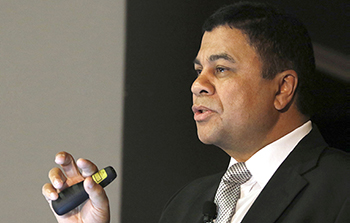
Prof Francis Petersen
The Council of the University of the Free State (UFS) is pleased to announce that it has decided to appoint Prof Francis Petersen as Vice-Chancellor and Rector of the UFS.
Announcing the decision to appoint Prof Petersen today (Friday 2 December 2016) during the quarterly Council meeting on the Bloemfontein Campus, the Chairperson of the UFS Council, Judge Ian van der Merwe, said the university was fortunate to be able to appoint a candidate of such good quality to the position.
Prof Petersen, Deputy Vice-Chancellor: Institutional Innovation at the University of Cape Town (UCT), and Prof Lis Lange, Vice-Rector: Academic at the UFS, were in line for the position. The university’s Selection Committee expressed equal preference for both and the two candidates were therefore recommended to Council for the position.
“It has been a truly participatory and transparent selection process, which has assisted in the Council being able to make this decision. The higher-education sector has been through a difficult and challenging time during the past few months and the Council is thankful that a leader like Prof Petersen can head the university in 2017 and beyond,” said Judge Van der Merwe.
In his statement of intent, which was submitted earlier as part of the application for the post, Prof Petersen indicated that it is important to imagine the UFS’s location in South Africa and Africa, to realise the challenges within this context, now and in the future, so as to sharpen the university’s focus to become a more inclusive, academic excellent institution, embedded in a culture of innovation. “Therefore, the ideal of academic excellence must be supported by an institutional framework of diversity and inclusivity. The Academic Project should focus on a unique educational experience for every UFS student, the enhancement of student throughput-rate in academic programmes through dedicated academic support, graduate attributes, and curriculum change and renewal,” he said. He furthermore stated that research and innovation must focus on impact and international visibility. “It is thus not only the increase in research and innovation output, but the quality and impact thereof.”
Prof Petersen was previously the Dean of Engineering and the Built Environment at UCT. He brings to the position of Vice-Chancellor and Rector his extensive experience of management in both the industry and academic sectors. He has been the executive head of strategy at Anglo American Platinum and head of the Department of Chemical Engineering at the Cape Technikon (now Cape Peninsula University of Technology). He is a member of the UCT Council, non-executive director on the Board of Pragma Holdings, non-executive director on the Board of the Unlimited Group, and Chairman of the Board of Trustees of the Seedcap (Venture Capital) Trust. Among others, he previously served as member on the Board of the Council of Scientific and Industrial Research, the National Advisory Council on Innovation, and the Council of the Academy of Science of South Africa.
He graduated from Stellenbosch University with a BEng (Chem Eng), MEng (Metal Eng), and PhD (Eng) degrees and completed a short course on Financial Skills for Executive Management. He is a recipient of the Ernest Oppenheimer Memorial Trust Award for research excellence, and was visiting professor at the Cape Technikon and extraordinary professor in the Department of Chemical Engineering at Stellenbosch University. He is a regular reviewer of journals, and member of a range of editorial boards for international journals.
Prof Petersen is also a registered professional engineer with the Engineering Council of South Africa and a Fellow of both the South African Institute of Mining and Metallurgy, and the South African Academy of Engineers.
Prof Petersen succeeds Prof Jonathan Jansen, who stepped down as Vice-Chancellor and Rector of the UFS on 31 August 2016. An international executive search agency specialising in academic appointments has assisted the UFS Council in its search for top-quality candidates.
Released by:
Lacea Loader (Director: Communication and Brand Management)
Telephone: +27 51 401 2584 | +27 83 645 2454
Email: news@ufs.ac.za | loaderl@ufs.ac.za
Fax: +27 51 444 6393